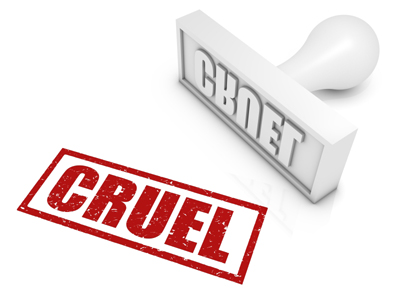I have a dear friend who is a breast cancer oncologist. It is hardly unusual for women to cry in her office, but one incident that she shared truly shocked me.
When my friend opened the exam room door, her patient was already crying. No, she wasn’t feeling ill. No, her disease was not progressing. In fact, she had come to the appointment eager to celebrate her progress. Why, then, was she crying?
When she checked in at the front desk of the office, the secretary had looked at her and blurted out, “You’re bald! What happened to your beautiful hair?”
How could the secretary be so unthinkingly cruel? Obviously her hair had fallen out from chemotherapy.
That topped my list for clueless cruelty until yesterday. That’s when I read Why I don’t breastfeed, if you must know, by Emily Wax-Thibodeau.
Wax-Thibodeau has also battled breast cancer. She was subjected to unfathomable cruelty, not from a medical secretary, but from people who ought to know better, lactation consultants.
The truth is, I’m a breast cancer survivor, and after a double mastectomy with reconstruction, which probably saved my life, I simply wasn’t able to breast-feed…
Five years after the operation that saved her life:
… We were cleared to try getting pregnant. But because chemotherapy ravages fertility and I was now 37, we found ourselves saving money and signing up for in vitro fertilization.
It took two rounds of IVF to get pregnant.
On Jan. 29, 2014, I gave birth to a 71 / 2-pound baby boy who had a head full of light brown hair and whose ravenous appetite and old-man snore we instantly found mesmerizing, maybe in a way only parents could.
“You never gave up,” my husband said, laughing as he watched Lincoln gulp down his first two-ounce serving of formula, which my husband fed to him.
As the two of them cuddled afterward, I was in a mood that I can describe only as postpartum elation.
That is, until those I jokingly call the “breast-feeding nazis” came marching in to my room.
Despite her medical history:
“You really should breast-feed,” the hospital’s lactation consultants, a.k.a. “lactivists,” said.
When I simply said, “I’m going to do formula,” they didn’t want to leave it at that.
So holding my day-old newborn on what was one of the most blissful days of my life, I had to tell the aggressive band of well-intentioned strangers my whole cancer saga.
You might think that would have shut them up. You would be wrong.
“Just try,” they advised. “Let’s hope you get some milk.”
“It may come out anyway, or through your armpits,” another advised later …
These are supposed health professionals. Their ignorance is astounding — mastectomy removes all breast tissue, even the tail of the breast that extends into the armpit — but their cruelty is truly mind-boggling. What’s next, chiding a paraplegic to get out of that wheelchair and exercise?
But as I’ve written many times in the past, many lactation consultants aren’t healthcare professionals. They are laypeople who had an easy time breastfeeding and enjoy feeling morally superior to other mothers. Shaming is integral to lactivism because shaming others is integral to the self-image of lactivists. All their so-called “baby friendly” initiatives — locking up formula in hospitals, mandating lectures on the benefits of breastfeeding to exhausted new mothers, abolishing well baby nurseries — aren’t friendly to babies, and they certainly aren’t friendly to mothers; they are friendly ONLY to lactivists.
Wax-Thibodeau almost feels relieved at having an “acceptable” reason for not breastfeeding.
As Jezebel’s Tracie Egan Morrissey wrote: “What those lactivist [expletive] conveniently forget to tell people — in their ongoing campaign of castigating bottle-feeding mothers as unnatural and ignorant, masking their concern-trolling as “support” — is that breastfeeding, for many women, is an incredibly painful, almost traumatizing endeavor. It was all so miserable and I associated that misery with my new baby, whom I secretly resented.”
Others literally lowered their voices to a whisper, confessing as if they had committed a crime that they supplemented breast-feeding with formula.
Why did they feel they had to whisper? In many ways, it reminded me of the stigma that comes with having a C-section.
The comparison is telling. Lactivists are often natural childbirth advocates, too. And in the same way that they grossly inflate the benefits of breastfeeding, they grossly exaggerate the “risks” of C-sections.
Many years ago I read Harold Kushner’s outstanding book When Bad Things Happen to Good People. Kushner offered an important insight into why people saying unspeakably cruel things to those who suffer misfortune. When confronted with someone who has suffered a tragedy, people often say “It could have been worse” but they mean “it could have been me.” In other words, many cruel remarks directed toward others are actually self-referential.
That is precisely what is going on with the shaming and blaming so beloved of lactivists and lactation consultants. Their comments, and even many of their “scientific” claims are self-referential. They reflect the need for lactivists and lactation consultants to boost their own self-esteem by criticizing others, often under the guise of “support.”
I have bad news for lactivists. In industrialized countries, the benefits of breastfeeding, while real, are trivial. Lactivists are not superior to other mothers; they are just women who chose one excellent form of infant nutrition over another excellent form of nutrition. They wield guilt, not for the benefit of babies, and certainly not for the benefit of mothers. They wield guilt for the benefit of themselves. Their cruelty comes from their self-absorption and those who are victims of that cruelty should not despair.
How you feed your baby is irrelevant. How you love your baby is what counts!


